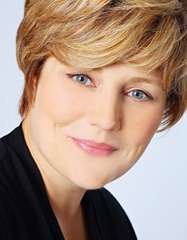|
Back
The TMC celebrates 120 years Toronto
Koerner Hall
10/14/2014 - & October 15, 2014
Franz Josef Hayden: Mass in D minor ("Lord Nelson Mass"), Hob. XXII:11
Wolfgang Amadeus Mozart: Requiem in D minor, K. 626
Lesley Bouza (soprano), Anita Krause (mezzo-soprano), Charles Davidson (tenor), Sean Watson (bass-baritone)
The Toronto Mendelssohn Choir, Festival Orchestra, Noel Edison (conductor), Caron Daley (associate conductor)

A. Krause (© Paula Tizzard)
The Toronto Mendelssohn Choir proudly turns 120 this year, making it the oldest continuing musical organization in Toronto if not the country. Its Artistic Director since 1997, the 7th in its history, is Noel Edison.
The full choir has 137 members, of whom 110 took part in this concert. At first I suspected this might lead to the situation experienced in last season’s performance of Beethoven’s Missa Solemnis (reviewed here when the too-large choir threw the performance off-balance. Happily, such was not the case with the two works on this program.
Haydn’s Lord Nelson Mass was led by the choir’s current associate conductor, Caron Daley. The mass was composed in 1798 during a period of uncertainty and upheaval due to the Napoleonic wars. The composer originally listed it as Missa in Angustiis, or “Mass in Time of Trouble” (or, more accurately, anguish) (his previous mass was the Mass in Time of War). It was very fitting that the soprano solo in the dramatic opening Kyrie was ardently voiced by Leslie Bouza as an anguished cry for mercy.
Like the expressive Ms Bouza, the other three soloists were well-chosen: mezzo Anita Krause treated us to her ever-reliable mastery in this repertory, and bass-baritone Sean Watson provided authoritative support in the low lines. Tenor Charles Davidson displayed an attractive, youthful, airy sound that melded nicely with the other voices.
I was permitted to attend the final rehearsal the night before the performance, a valuable experience for insights into both conductors’ aims and techniques. Ms Daley’s witty and precise focus on what needs to be done gave the Haydn work sharp definition. A highlight was the Credo with its energetic soaring lines.
In his remarks introducing Mozart’s Requiem, Noel Edison admitted that it is one of the four choral works guaranteed to fill a hall (the other three - no surprises - being Handel’s Messiah, Beethoven’s Ninth Symphony, and Orff’s Carmina Burana). As we all know, Mozart’s final illness and death prevented him from completing the work so his student, Franz Süssmayer, was asked to do so. There are widely-acknowledged flaws in the result, and many conductors (Edison among them) have used other completions. On this occasion he has returned to Süssmayer’s version because, he explained, “after all, Süssmayer was there”.
“Make it bold!” exhorted Edison as the choir began Mozart’s Kyrie. The results were dramatic, as was the gripping attack at the start of the Dies irae. Later on there were vivid contrasts in the Confutatis, notable precision in the Offertorium, and energetic ebb and flow in the Hostias. Towards the end of the piece there are stretches of Süssmayer’s merely serviceable contributions, but Mozart’s vivid opening lines re-appear at the finale where Edison held an impressively long final note. Overall, the choir managed an emphatic collective expression that was both relaxed and precise.
Attending the rehearsal brought forward insights on how the conductor of such a choir has to deal with not only the choir itself but the orchestra (29 players for this concert - this sounds small but held its own in Koerner Hall), plus the soloists. “We’ll be good on the night” said a chorister. I am sure they were. They certainly were good - and responsive - at this final rehearsal.
In recognition of the anniversary event, the concert began with both Canada’s royal and national anthems, God Save the Queen in the arrangement by Sir Ernest MacMillan (director of the choir from 1942 to 1957), and O Canada in the arrangement by Godfrey Ridout. Both versions are very choral (i.e., not for audience participation) - and both sound reassuringly grand.
Michael Johnson
|